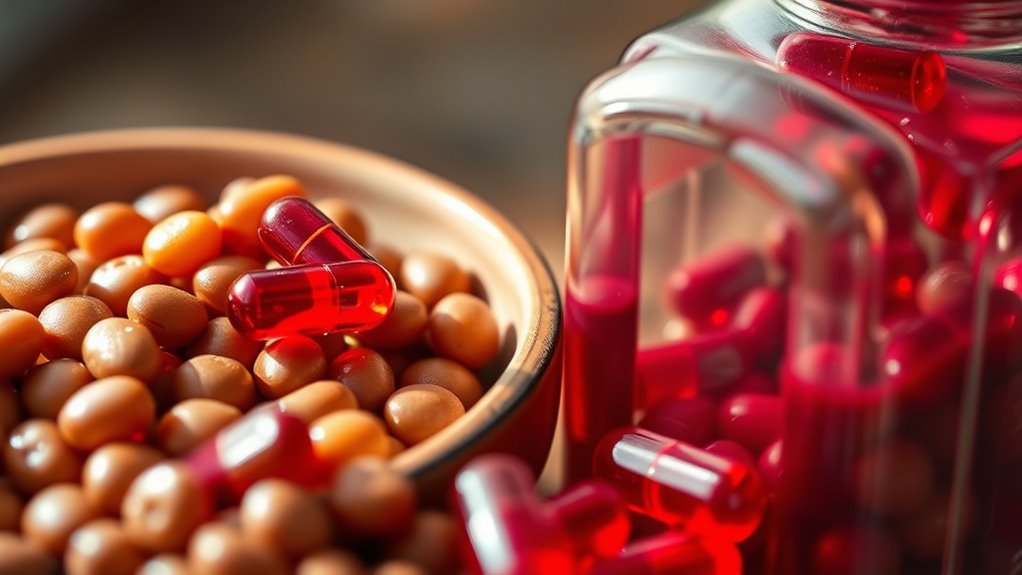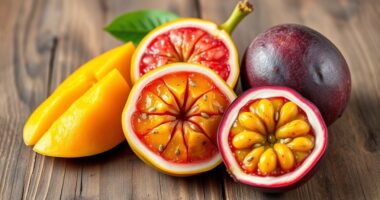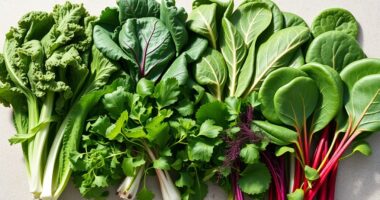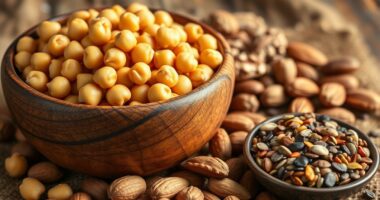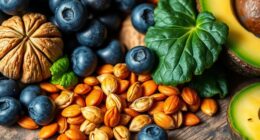Vitamin B12 fortification works by adding the nutrient to common foods like cereals or plant-based milks, making it easier for you to maintain adequate levels without changing your diet. However, fermented soy products like tempeh or miso contain very little B12, so they’re not reliable sources. Relying solely on fermented soy isn’t enough, but understanding how fortification supports your B12 intake can help you stay healthy—if you’re curious, there’s more to learn.
Key Takeaways
- Fortification adds B12 to foods like cereals and plant-based milks to help prevent deficiencies.
- B12 from fortified foods depends on regular consumption and individual absorption efficiency.
- Fermented soy products contain negligible B12 and cannot reliably meet daily B12 needs.
- Supplements provide concentrated, easily absorbed B12, ensuring consistent intake for those on plant-based diets.
- Relying solely on fermented soy for B12 is insufficient; fortified foods and supplements are more dependable sources.
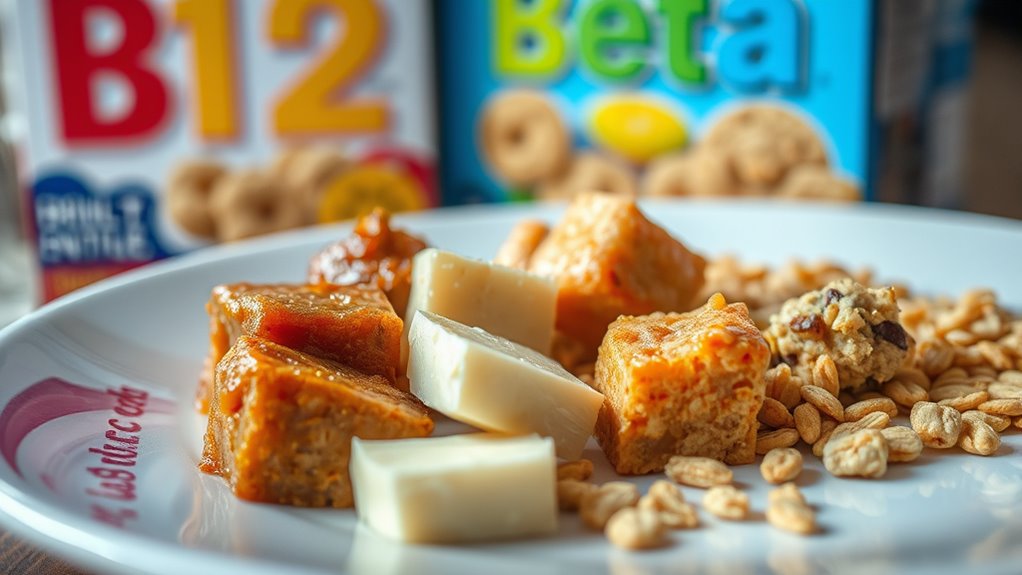
Have you ever wondered if your diet provides enough vitamin B12? If you follow a plant-based diet, this concern is especially valid. Unlike animal products, which naturally contain B12, plant-based sources are limited. Some foods like fortified cereals, nutritional yeast, and certain plant milks are enriched with B12, but relying solely on these can be risky. That’s because the body’s ability to absorb vitamin B12 from fortified foods or supplements varies among individuals. Supplement absorption can be hindered by factors like age, digestive health, and medication use. This means even if you’re consuming B12-fortified products regularly, your body might not be getting enough of the vitamin to meet your needs. This is where B12 fortification and supplementation come into play, ensuring a reliable supply regardless of dietary restrictions or absorption issues.
Fortification involves adding vitamin B12 to everyday foods, making it easier for people to maintain adequate levels without changing their eating habits drastically. Food manufacturers typically enrich products like cereals, plant-based milks, or snack foods with B12, so you can get a dose just by having your usual breakfast or snack. This approach benefits those who struggle with supplement absorption or who have limited access to B12-rich foods. However, while fortification is effective, it isn’t foolproof. The amount of B12 you receive from fortified foods depends on the product and how much you consume. Plus, not everyone consumes these products consistently, which can lead to gaps in intake.
Many people also turn to supplements to fill these gaps, and for good reason. Supplements offer a controlled, concentrated dose of vitamin B12, bypassing many of the issues surrounding absorption from food sources. When you take a B12 supplement, your body can absorb it directly through the small intestine, especially if taken in forms like sublingual tablets or injections. These methods can improve the efficiency of absorption, ensuring your body gets the vitamin it needs. Relying solely on fermented soy products, such as tempeh or miso, isn’t enough because these foods generally contain negligible amounts of B12. Fermented soy can be a nutritious part of your diet, but it shouldn’t be considered a reliable source of vitamin B12.
Frequently Asked Questions
Can Vegans Get Enough B12 Without Supplements?
You might wonder if vegans can get enough B12 from plant-based sources, but it’s unlikely without supplements. B12 bioavailability from plant foods is generally low, making it hard to meet your needs solely through diet. To stay healthy, consider fortified foods or B12 supplements, since they provide more reliable B12 levels. Relying solely on fermented soy or other plant sources isn’t enough to prevent deficiency.
How Long Does B12 Fortification Last in Foods?
Think of B12 fortification like a time capsule in your food—its storage stability determines how long it keeps its potency. Typically, with proper storage and advanced fortification techniques, B12 remains effective for several months to a year. Light, heat, and air can chip away at its power, so keep foods in cool, dark places. To guarantee consistent B12 intake, check labels and consume fortified foods within their recommended shelf life.
Does Natural B12 Differ From Synthetic Sources?
You might wonder if natural B12 differs from synthetic sources. Natural B12, found in animal products, often has higher bioavailability, meaning your body absorbs it better. Synthetic B12, added to fortified foods or supplements, is chemically identical but may vary in absorption depending on form and individual factors. Overall, both sources can effectively meet your needs, but natural B12 usually offers a slight advantage in bioavailability comparison.
Are There Risks of B12 Overdose From Fortified Foods?
Think you’re safe from B12 overdose? Well, think again—unless you enjoy flirting with toxicity concerns. Fortified foods are carefully regulated, with fortification limits designed to prevent excess intake. While toxicity from B12 is rare, overdoing it might cause some minor issues. Still, you’re unlikely to hit dangerous levels unless you rely heavily on supplements or fortified products. So, moderation remains your best friend in avoiding potential risks.
How Does B12 Absorption Vary Among Individuals?
You might notice that B12 absorption varies among individuals due to factors like age, stomach health, and genetic differences. Some people have genetic factors affecting intrinsic factor production, which is essential for B12 absorption. Others with gastrointestinal issues or certain medications may struggle to absorb B12 efficiently. Recognizing this absorption variability helps you understand why some need fortified foods or supplements to meet their B12 needs effectively.
Conclusion
Fortifying foods with vitamin B12 is like giving your body a reliable toolbox, ensuring you get what you need even if your diet falls short. Relying solely on fermented soy is like trying to fix a leak with a bandaid—it might help temporarily but doesn’t solve the root problem. To truly support your health, make B12 fortification a regular part of your diet, so your body stays well-oiled and ready to perform at its best.

